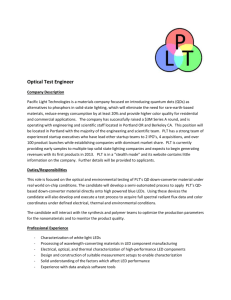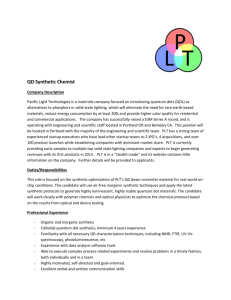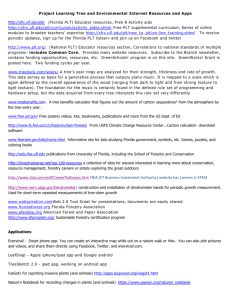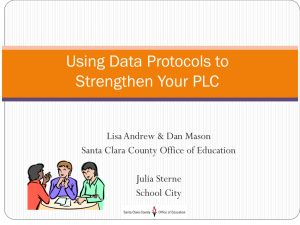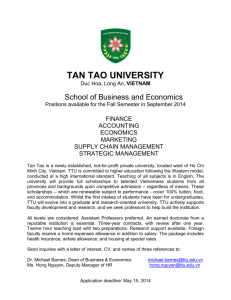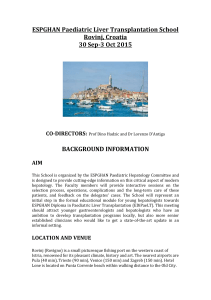FOED3010SyllSpring2015Suters
advertisement
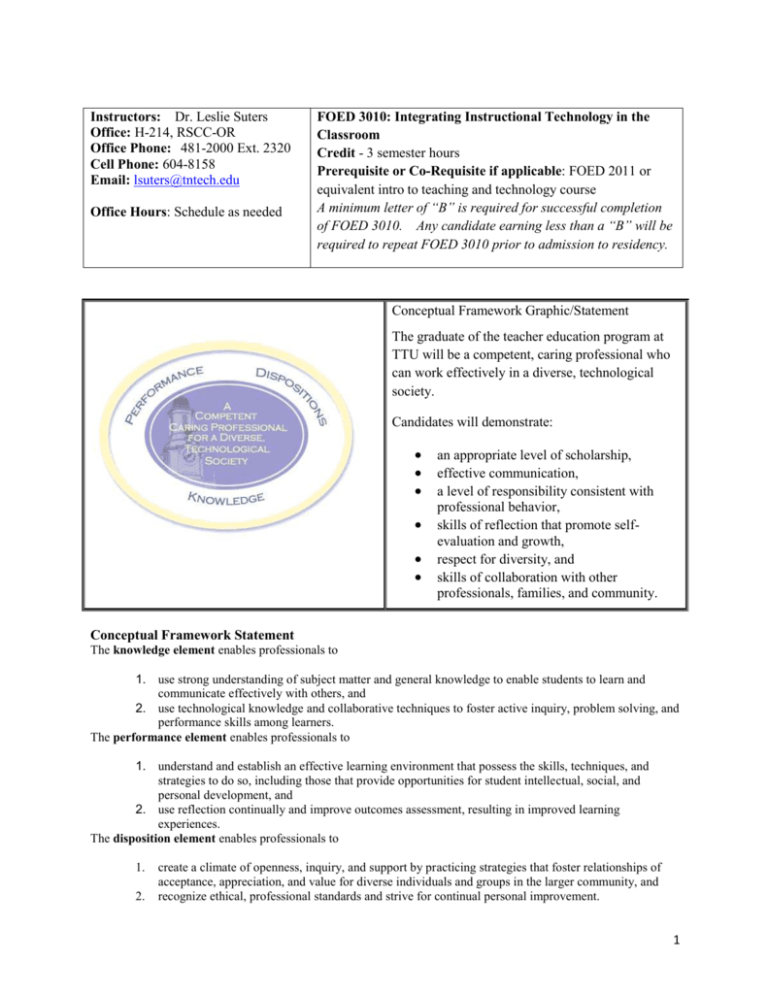
Instructors: Dr. Leslie Suters Office: H-214, RSCC-OR Office Phone: 481-2000 Ext. 2320 Cell Phone: 604-8158 Email: lsuters@tntech.edu Office Hours: Schedule as needed FOED 3010: Integrating Instructional Technology in the Classroom Credit - 3 semester hours Prerequisite or Co-Requisite if applicable: FOED 2011 or equivalent intro to teaching and technology course A minimum letter of “B” is required for successful completion of FOED 3010. Any candidate earning less than a “B” will be required to repeat FOED 3010 prior to admission to residency. Conceptual Framework Graphic/Statement The graduate of the teacher education program at TTU will be a competent, caring professional who can work effectively in a diverse, technological society. Candidates will demonstrate: an appropriate level of scholarship, effective communication, a level of responsibility consistent with professional behavior, skills of reflection that promote selfevaluation and growth, respect for diversity, and skills of collaboration with other professionals, families, and community. Conceptual Framework Statement The knowledge element enables professionals to 1. use strong understanding of subject matter and general knowledge to enable students to learn and communicate effectively with others, and 2. use technological knowledge and collaborative techniques to foster active inquiry, problem solving, and performance skills among learners. The performance element enables professionals to 1. understand and establish an effective learning environment that possess the skills, techniques, and strategies to do so, including those that provide opportunities for student intellectual, social, and personal development, and 2. use reflection continually and improve outcomes assessment, resulting in improved learning experiences. The disposition element enables professionals to 1. 2. create a climate of openness, inquiry, and support by practicing strategies that foster relationships of acceptance, appreciation, and value for diverse individuals and groups in the larger community, and recognize ethical, professional standards and strive for continual personal improvement. 1 Class Meetings Thursday 9:00-12:00 (Scott Co.); Friday 12:00-3:00 (Pellissippi) See assignment calendar for additional details and exceptions There is an iLearn component to this course. elearn.tntech.edu (this is where I will post your grades) Course description This course teaches preservice teachers the importance of technology inclusion within the traditional curriculum. Preservice teachers will learn how to use technology to enhance the delivery of content in the classroom. Required Texts Pitler, H., Hubbell, E., & Kuhn, M. (2012). Using technology with classroom instruction that works. 2nd Edition. ASCD & MCREL Required Special Instructional Materials 1.) USB Flash/Data Drive Attendance Policy Due to the amount of content covered, students are required to attend each class. If a situation arises which requires you to be absent, you should notify your professor immediately. You will be expected to email or post any work that is due on the date of your absence. It is your responsibility to schedule an appointment with the instructor in order to plan make-up work if you have an excused absence. Note: All absences should be supported with documentation presented to your professor upon your return to class. Please be advised that according to TTU Policy more than 3 absences can result in course failure. Professionalism Grade Ten percent of your course grade will be determined by your professionalism, including attendance, punctuality, and class participation. Please remember that reading assignments must be completed prior to the designated class; failure to read the assignments will affect your ability to participate in class discussions. The following points will be deducted from your professionalism grade if deemed necessary: 10 points for each absence; 5-10 points for tardiness or leaving class early (each time); up to 10 points for failure to complete readings or participate in class. Assignment Policy Assignments are due as described on the assignment calendar. Late assignments will not be accepted unless there are extenuating circumstances, which will be determined on a case-by-case basis. If the instructor deems it appropriate and agrees to accept a late assignment, the student will incur a late penalty of 20% of the final grade for each day it is late (including Saturday and Sunday). Important Note: You may be asked to revise an assignment in order to help you better learn the material. The final grade for the revised assignment will be an average of the original grade and the grade earned for the revised work. 2 Cell Phone Etiquette Cell phones should be turned off or on vibrate and not used during class. Only exceptions will be the use of the phone as a calculator, stopwatch, or other application for in-class work. TTU Library Online Access The Tennessee Tech Library is available to all candidates enrolled at TTU. Links to the library materials (such as electronic journals, databases, interlibrary loans, digital reserves, dictionaries, encyclopedias, maps, and librarian support) and Internet resources are available to complete assignments. To access the online databases, use your TTU PC Lab username and password. If you do not know your TTU username and password see the following: http://copyright.lib.utexas.edu/ . More information on electronic media is available at the TTU Library http://www.tntech.edu/library/. Copyright and Fair Use All projects created in this course should follow appropriate copyright and fair use guidelines. Additional information is available at: http://www.utsystem.edu/ogc/intellectualproperty/cprtindx.htm Please note: TTU personnel may display your work created during the scope of this course during accreditation, conference presentations, workshops, and/or future classes. TTU Office of Disability Service Candidates with a disability requiring special accommodations should contact the Office of Disability Services (ODS). An Accommodation Request (AR) should be completed as soon as possible, preferably by the end of the first week of the course. The TTU Office of Disabilities is located in the Roaden University Center (RUC), Room 112; Phone 931-372-6119. For additional information see http://www.tntech.edu/disability/ Pandemic Plan Should normal classroom activities at your placement be disrupted by a pandemic outbreak, the format for this course may be modified to enable completion. In that event, new instructions for the continuation of the course will be provided (Source: TTU University Faculty Meeting, August 25, 2009). TTU Plagiarism Policy When you use (for example, quote or even summarize or paraphrase) someone else’s media, words, data, ideas, or other works, you must cite your source. You should be especially careful to avoid plagiarizing Internet sources (for example, e-mail, chat rooms, Web sites, or discussion groups). It does not matter whether you borrow material from print sources, from the Internet, from on-line databases, or from interviews. Failure to cite your source is plagiarism. Students who plagiarize may receive an “F” or a “0” for the assignment, or an “F" for the course. http://www.tntech.edu/ttustudenthandbook/academic-regulations/ Tk20 at TTU In efforts to improve our processes, manage candidate transition points, and track key assessments in program coursework, TTU’s College of Education utilizes Tk20, a comprehensive data and reporting system. All College of Ed students are required to purchase and maintain a Tk20 account. The one-time system cost is $133.33 at the university bookstore, and your account is valid for seven years. You will access Tk20 for a variety of tasks, including coursework, advisement, clinical experiences, Residency, portfolio-building edTPA tasks, and key program assessments. All professional education courses will include assessments within Tk20. Check your syllabi and consult your instructors for assessments that must be submitted to Tk20. Failure to purchase Tk20 can result in a “0” for Tk20 assignments and/or final course grade reduced a full letter. See our website for more details: https://tntech.tk20.com 3 Topics Covered Emerging technologies; Internet strategies; hardware/software set-up, utilization; digital media; electronic presentations; technology integration; technological applications; instructional movie production; and multimedia development. Major Teaching Methods Models of instruction utilized in the course will include: lecture, discussion, experimentation, cooperative techniques, technology application and production, lab demonstration, modeling, reflection, and group investigation. Course Objectives & Assignments Assessment Praxis Test/Topic Reflective Discussion (TPE Standards 1, 7, 9) Engage in reflection throughout the course and actively locate professional resources. Rubric PLT Early Childhood; PLT K-6; PLT 5-9 Objective Standard Assignment(s) Assessment Praxis Test/Topic Word Processing, Presentation, and Spreadsheet Software NETS-T 1 a,b,c,d; NETS-T 2 a,b,c; NETS-T 3 d; NETS-T 4 b; NETS-T 5 c Create a newletter, presentation, and collect/analyze data Rubrics PLT Early Childhood; PLT K-6; PLT 5-9 Objective Standard Assignment(s) Assessment Praxis Test/Topic Web 2.0 Collection NETS-T 1 a,b,c,d; NETS-T 2 a,b,c; NETS-T 3 d; NETS-T 4 b; NETS-T 5 c Create a collection of Web 2.0 artifacts from a selected list shared in class Rubric PLT Early Childhood; PLT K-6; PLT 5-9 Objective Standard Assignment(s) Assessment Interactive WhiteBoard NETS-T 1 a,b,c; NETS-T 2 a,b,c; NETS-T 3 b Develop an assignment that can be used to teach a content specific standard Rubric, Demonstrate the ability to develop and present lessons using interactive whiteboard software PLT Early Childhood; PLT K-6; PLT 5-9 Objective Standard Assignment(s) Praxis Test/Topic Assessment Praxis Test/Topic Digital Photography and Integration NETS-T 1 a,b,c; NETS-T 2 a,b,c; NETS-T 3 a,b,c; NETS-T 4 b,c Design and develop an educational slideshow that can be used to teach a specific standard. Rubric PLT Early Childhood; PLT K-6; PLT 5-9 Objective Standard Assignment(s) Assessment Praxis Test/Topic Garageband Podcast/Digital Story NETS-T 1 a,b,c; NETS-T 2 a,b,c; NETS-T 3 a,c,d Develop and present an audio and enhanced audio digital story. Rubric, presentation PLT Early Childhood; PLT K-6; PLT 5-9 Objective Standard Assignment(s) 4 Objective Standard Assignment(s) Assessment Praxis Test/Topic Graphite App Flows Lesson Plans NETS-T 1 a,b,c,d; NETS-T 2 a,b,c; NETS-T 3 d; NETS-T 4 b; NETS-T 5 c Standards-based lesson plan that integrates iPad & Web 2.0 technology Rubric PLT Early Childhood; PLT K-6; PLT 5-9 Objective Standard Assignment(s) Assessment Praxis Test/Topic iMovie NETS-T 1 a,b,c; NETS-T 2 a,b,c; NETS-T 3 a,b,c; NETS-T 4 a iMovie production Rubric, movie presentation, reflection, peer evaluation PLT Early Childhood; PLT K-6; PLT 5-9 Grading and Evaluation Date Due Assignments Reflective Discussion Narrated PPT/Keynote Presentation on Trend/Issue in Technology SMART Interactive Whiteboard Flipchart Google Forms Survey, Analysis & Newsletter iBooks Author - creation of iBook Class Response/Organization System Handout & Presentation GIS Story Map STEM Lesson Plan STEM/Hour of Code Saturday & Reflection Instructional iMovie Project TPACK Thinglink & Blendspace Reflection Professionalism Total Points Grading Scale A 93-100% B 85-92% C 77-84% D 69-76% F Below 69% Points Possible 25 25 Percentage Of Grade 5% 5% 25 50 75 50 25 50 50 50 25 50 500 5% 10% 15% 10% 5% 10% 10% 10% 5% 10% 100% 465-500 425-464 385-424 345-384 Below 345 The instructor reserves the right to adjust this syllabus with appropriate notice to students. 5 ISTE NETS-T Standards 1. Facilitate and Inspire Student Learning and Creativity Teachers use their knowledge of subject matter, teaching and learning, and technology to facilitate experiences that advance student learning, creativity, and innovation in both face-to-face and virtual environments. a. Promote, support, and model creative and innovative thinking and inventiveness b. Engage students in exploring real-world issues and solving authentic problems using digital tools and resources c. Promote student reflection using collaborative tools to reveal and clarify students' conceptual understanding and thinking, planning, and creative processes d. Model collaborative knowledge construction by engaging in learning with students, colleagues, and others in faceto-face and virtual environments 2. Design and Develop Digital Age Learning Experiences and Assessments Teachers design, develop, and evaluate authentic learning experiences and assessment incorporating contemporary tools and resources to maximize content learning in context and to develop the knowledge, skills, and attitudes identified in the NETS·S. a. Design or adapt relevant learning experiences that incorporate digital tools and resources to promote student learning and creativity b. Develop technology-enriched learning environments that enable all students to pursue their individual curiosities and become active participants in setting their own educational goals, managing their own learning, and assessing their own progress c. Customize and personalize learning activities to address students' diverse learning styles, working strategies, and abilities using digital tools and resources d. Provide students with multiple and varied formative and summative assessments aligned with content and technology standards and use resulting data to inform learning and teaching 3. Model Digital Age Work and Learning Teachers exhibit knowledge, skills, and work processes representative of an innovative professional in a global and digital society. a. Demonstrate fluency in technology systems and the transfer of current knowledge to new technologies and situations b. Collaborate with students, peers, parents, and community members using digital tools and resources to support student success and innovation c. Communicate relevant information and ideas effectively to students, parents, and peers using a variety of digital age media and formats d. Model and facilitate effective use of current and emerging digital tools to locate, analyze, evaluate, and use information resources to support research and learning 4. Promote and Model Digital Citizenship and Responsibility Teachers understand local and global societal issues and responsibilities in an evolving digital culture and exhibit legal and ethical behavior in their professional practices. a. Advocate, model, and teach safe, legal, and ethical use of digital information and technology, including respect for copyright, intellectual property, and the appropriate documentation of sources b. Address the diverse needs of all learners by using learner-centered strategies providing equitable access to appropriate digital tools and resources c. Promote and model digital etiquette and responsible social interactions related to the use of technology and information d. Develop and model cultural understanding and global awareness by engaging with colleagues and students of other cultures using digital age communication and collaboration tools 5. Engage in Professional Growth and Leadership Teachers continuously improve their professional practice, model lifelong learning, and exhibit leadership in their school and professional community by promoting and demonstrating the effective use of digital tools and resources. a. Participate in local and global learning communities to explore creative applications of technology to improve student learning b. Exhibit leadership by demonstrating a vision of technology infusion, participating in shared decision making and community building, and developing the leadership and technology skills of others c. Evaluate and reflect on current research and professional practice on a regular basis to make effective use of existing and emerging digital tools and resources in support of student learning d. Contribute to the effectiveness, vitality, and self-renewal of the teaching profession and of their school and community 6
